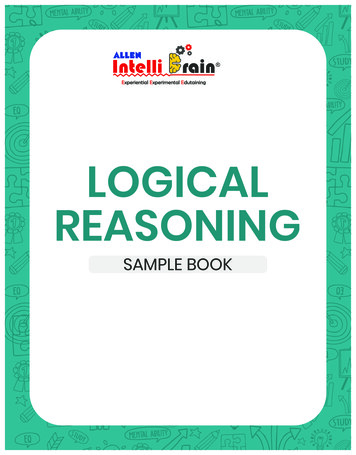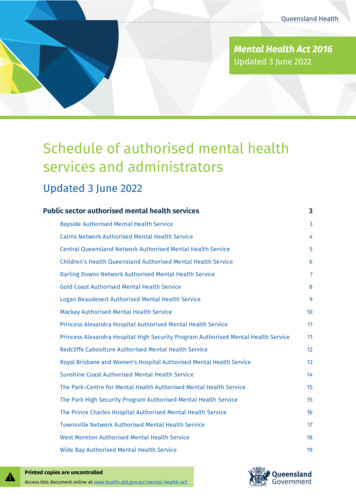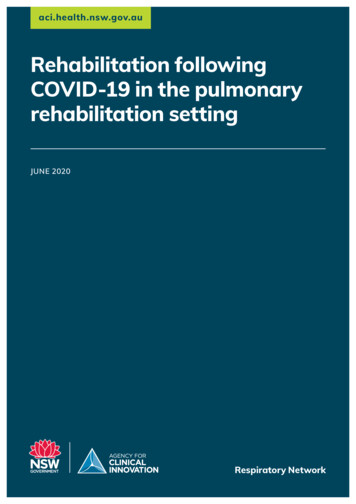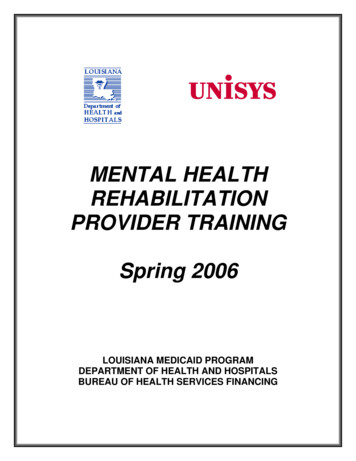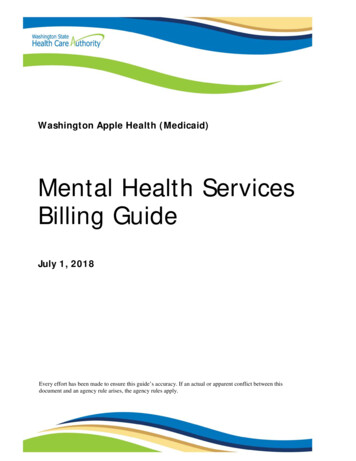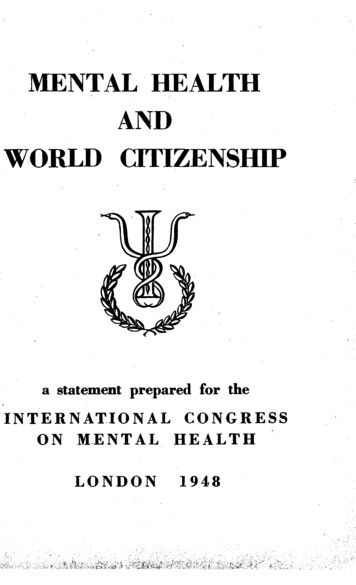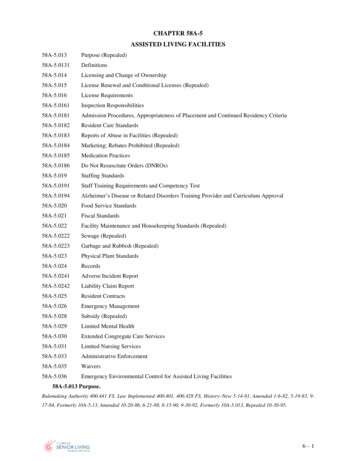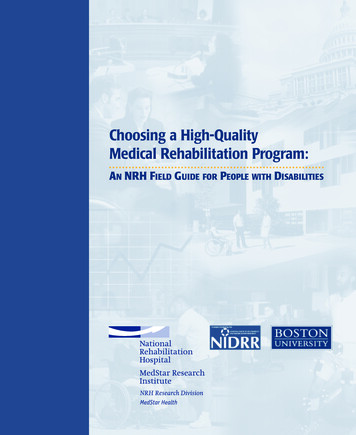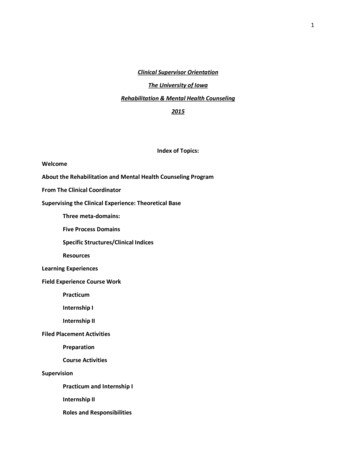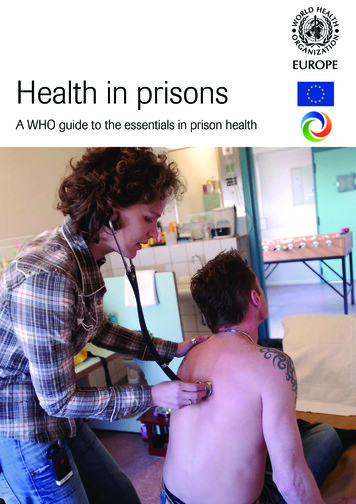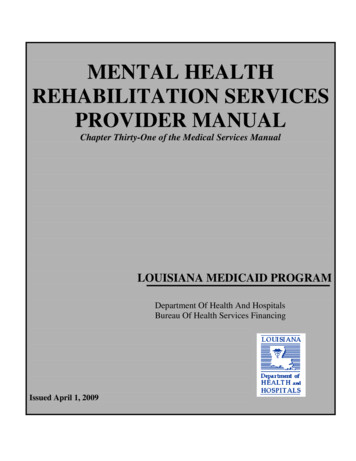
Transcription
MENTAL HEALTHREHABILITATION SERVICESPROVIDER MANUALChapter Thirty-One of the Medical Services ManualLOUISIANA MEDICAID PROGRAMDepartment Of Health And HospitalsBureau Of Health Services FinancingIssued April 1, 2009
LOUISIANA MEDICAID PROGRAMISSUED:REPLACED:CHAPTER 31: MENTAL HEALTH REHABILITATIONSECTION: TABLE OF CONTENTS04/01/0906/01/05PAGE (S) 7MENTAL HEALTH REHABILITATION (MHR)TABLE OF CONTENTSSUBJECTSECTIONOVERVIEWMHR Program Services PackageSECTION 31.0Covered ServicesMandatory ServiceOptional ServicesScreening for Medical NecessityMedical Necessity CriteriaAdult Criteria for ServicesChildren/Youth Criteria for ServicesExclusionary CriteriaDischarge CriteriaSERVICESServices DeliveryMandatory ServicesSECTION 31.1Assessment and Service PlanningService DefinitionProgram RequirementsService /Recovery Focused Crisis PlanDischarged PlansStaffing RequirementsService Specific Documentation RequirementsService Authorization PeriodsPage 1 of 7Table of Contents
LOUISIANA MEDICAID PROGRAMISSUED:REPLACED:CHAPTER 31: MENTAL HEALTH REHABILITATIONSECTION: TABLE OF CONTENTSSUBJECT04/01/0906/01/05PAGE (S) 7SECTIONCommunity SupportService DefinitionProgram RequirementsPlace of Service and Frequency of ContactStaff RequirementsService Authorization PeriodsGroup CounselingService DefinitionClinical ExclusionsProgram RequirementsPlace of ServiceStaffing RequirementsService Authorization Periods and Service LimitsIndividual InterventionService DefinitionPlace of ServiceStaffing RequirementsService Authorization PeriodsMedication ManagementService DefinitionProgram RequirementsStorage of MedicationsStaffing RequirementsService Specific Documentation RequirementsPlace of ServiceService Authorization PeriodsParent/Family Intervention (Counseling)Service DefinitionProgram RequirementsPlace of ServiceStaffing RequirementsService Authorization PeriodsPsychosocial Skills Training-Group (Youth)Service DefinitionClinical ExclusionsProgram RequirementsPlace of ServiceStaffing RequirementsService Authorization PeriodsOptional ServicesPage 2 of 7Table of Contents
LOUISIANA MEDICAID PROGRAMISSUED:REPLACED:CHAPTER 31: MENTAL HEALTH REHABILITATIONSECTION: TABLE OF CONTENTSSUBJECT04/01/0906/01/05PAGE (S) 7SECTIONMandatory Services (cont’d)Parent/Family Intervention (Intensive) (Youth Only)Service DefinitionProgram RequirementsDuration of TreatmentIntensity of ServiceFace-to-Face Contact and Location ServiceTeam CaseloadCrisis ManagementAvailabilityPlanning and ManagementFamily InvolvementTeam Case CoordinationComprehensive Mix of ServicesSystem CollaborationStaffing RequirementsService Authorization PeriodsPsychosocial Skills Training – Group (Adult)Service DefinitionClinical ExclusionsProgram RequirementsPlace of ServiceStaffing RequirementsService Authorization PeriodsSERVICE ACCESS AND AUTHORIZATIONService Access and Authorization ProcessSECTION 31.2Phase One: Screening for MHR EligibilityPhase Two: Determining Eligibility and Developing Interim ISRPApproval for EligibilityDenial for EligibilityPhase Three: Developing the Initial ISRPApproval for Initial ServicesDenial for Initial ServicesPhase Four: Conducting a Reassessment and Updating the ISRPApproval for Continued ServiceDenial for Continued ServicesPage 3 of 7Table of Contents
LOUISIANA MEDICAID PROGRAMISSUED:REPLACED:CHAPTER 31: MENTAL HEALTH REHABILITATIONSECTION: TABLE OF CONTENTSSUBJECT04/01/0906/01/05PAGE (S) 7SECTIONOther Service Access and Authorization ActivitiesRequest for RevisionApproval for RevisionDenial for RevisionAccess to Emergency ServicesNew RecipientsActive RecipientsRecipient TransferRecipient ReadmissionReconsiderationAppeal ProcessProvider ClosureRe-establishing Services to Displaced Recipients Due to DisasterPROVIDER CERTIFICATION/RECERTIFICATIONInitial Certification and EnrollmentSECTION 31.3Initial Certification and Enrollment ApplicationsOptional Services CertificationOptional Services Certification ApplicationsCertification ProcessProvider Application ReviewApplication and Site Review(s)Initial Certification Approval and EnrollmentLoss of CertificationDiscontinuation of Adult PSR and PFII ServicesRecertificationFailure to RecertifyAccreditationChanges or Events that Must Be ReportedChanges to Report to Fiscal AgentChanges to Report to OMHChange of AddressOff-site Service Deliver LocationChange in Contact InformationChange of PopulationChange of Ownership (CHOW)Request to Discontinue Offering One or More Optional ServicesPage 4 of 7Table of Contents
LOUISIANA MEDICAID PROGRAMISSUED:REPLACED:CHAPTER 31: MENTAL HEALTH REHABILITATIONSECTION: TABLE OF CONTENTSSUBJECT04/01/0906/01/05PAGE (S) 7SECTIONAgency ClosuresStaffAccreditation StatusInsurance CoverageHours of OperationReportable EventsPROGRAM OPERATIONSGeneral ProvisionsSECTION 31.4Organizational StructureCooperative AgreementPolicy ManualQuality Management PolicyProgram PhilosophyProvider OperationsSTAFFING AND TRAININGStaffing RequirementsSECTION 31.5Personnel RecordsConfidential InformationStaff QualificationsLicensed Mental Health Professional (LMHP)PsychiatristPsychologistAdvanced Practice Registered Nurse (as LMNP)Licensed Clinical Social WorkerLicensed Professional CounselorApproved Clinical Evaluator (ACE)Mental Health Professional (MHP)Mental Health Specialist (MHS)Registered Nurse (RN)Licensed Practical Nurse (LPN)Staff ResponsibilitiesBackup StaffSupervisionInitial SupervisionOngoing SupervisionPage 5 of 7Table of Contents
LOUISIANA MEDICAID PROGRAMISSUED:REPLACED:CHAPTER 31: MENTAL HEALTH REHABILITATIONSECTION: TABLE OF CONTENTSSUBJECT04/01/0906/01/05PAGE (S) 7SECTIONOrientation and TrainingOrientation and Training HoursOrientation On-Site InstructionsOn-the-Job TrainingLOCUS and CALOCUS TrainingOther Required TrainingJob Specific TrainingAnnual TrainingQualified TrainersBureau TrainingRECORD KEEPINGRetention of RecordsDestruction of RecordsConfidentiality and Protection of RecordsSECTION 31.6Review by State and Federal AgenciesAdministrative and Personnel RecordsRecipient RecordsComponents of Recipient RecordsService LogsPROGRAM MONITORINGMonitoringSECTION 31.7InterviewsMonitoring ResultsPlan of CorrectionADMINISTRATIVE SANCTIONSGrounds for Sanctioning ProvidersSECTION 31.8Informal ReviewNotice of Appeal ProcedurePage 6 of 7Table of Contents
LOUISIANA MEDICAID PROGRAMISSUED:REPLACED:CHAPTER 31: MENTAL HEALTH REHABILITATIONSECTION: TABLE OF CONTENTSSUBJECT04/01/0906/01/05PAGE (S) 7SECTIONFINANCIAL REIMBURSEMENTGeneral Provisions for ReimbursementSECTION 31.9Information Transfer/Billing ScheduleDocumentation RequirementsACRONYMS/DEFINITIONSSECTION 31.10Hardware and IT RequirementsAPPENDIX ALetter of AttestationAPPENDIX BDHH Research PolicyAPPENDIX CService LogAPPENDIX DMessage to EPSDT Eligibles and ParentsAPPENDIX EPage 7 of 7Table of Contents
LOUISIANA MEDICAID PROGRAMISSUED:04/01/09REPLACED: 06/01/05CHAPTER 31: MENTAL HEALTH REHABILITATIONSECTION 31.0: OVERVIEWPAGE(S) 7OVERVIEWThe Mental Health Rehabilitation Program is administered by the Department of Healthand Hospitals through a partnership of the Bureau of Health Services Financing(Bureau/BHSF), the fiscal intermediary, the Office of Mental Health (OMH), and thenetwork of certified and enrolled providers.The Bureau is the Louisiana Medicaid Program. The Bureau develops program rules,regulations, policies, and procedures for the operation of the program. It providesfunding for the reimbursement of prior authorized services to certified and enrolledproviders. Contact information:BHSF/Program Operations/MHR ProgramP.O. Box 91030Baton Rouge, LA 70821-9030Voice: 225-342-0124 Fax: 225-342-9462The Office of Mental Health, through an agreement with the Bureau, manages theoperation of the program through prior authorizing services, certifying new providers,recertifying enrolled providers, monitoring providers, and training activities. Contactinformation:The Office of Mental Health1885 Wooddale Blvd., 9th FloorBaton Rouge, LA 70806Voice: 225-922-0006 Fax: 225-925-4789UNISYS is the fiscal intermediary that processes billing claims, assists providers withbilling problems, and completes the enrollment of new providers. Contact information:UNISYS Provider Enrollment and Provider RelationsPost Office Box 80159Baton Rouge, LA 70898-0159Provider Enrollment Unit:Voice: 225-216-6370Provider Relations:Voice: 225-924-5040 or 1-800-473-2783Page 1 of 7Section 31.0
LOUISIANA MEDICAID PROGRAMISSUED:04/01/09REPLACED: 06/01/05CHAPTER 31: MENTAL HEALTH REHABILITATIONSECTION 31.0: OVERVIEWPAGE(S) 7Mental Health Rehabilitation (MHR) services for adults with serious mental illness andchildren with emotional/behavioral disorders are outpatient services which are medicallynecessary to reduce the disability resulting from mental illness and assist in the recoveryand resiliency of the recipient. These services are home and community-based and areprovided on an as needed basis to assist recipients in coping with the symptoms of theirillness. The intent of MHR services is to minimize the disabling effects on theindividual’s capacity for independent living and to prevent or limit the periods ofinpatient treatment. Providers offer prior authorized services to adults with mental illnessand youth with an emotional/behavioral disorder who meet medical necessity criteria forservices.This is an optional Medicaid service authorized under Section 440.130 of the 42 Code ofFederal Regulations. All services must be delivered in accordance with federal and statelaws, rules and regulations, this provider manual chapter and any other notices ordirectives issued by the Bureau. These services must be delivered by practitionersoperating within the scope of their license as required by the respective LouisianaPractice Acts. It is the responsibility of each provider to be knowledgeable regarding thepolicies and procedures governing MHR services and to be aware of revisions issued bythe Bureau.The provider may only serve recipients who reside in the provider’s designated servicearea and are prior authorized. To obtain a list of designated service areas visit the MHRwebsite, www.mhrsla.org. Reimbursement will not be paid for a duplicated service or aservice provided without prior authorization. The provider is required to focus on arecipient’s Individual Service/Recovery Plan (ISRP) and his/her environment to reducedependency on services where the least amount of services is required in the leastrestrictive environment.MHR services are expected to achieve the following outcomes: Assist recipients in the stabilization of acute symptoms of mental illness;Assist recipients in coping with the chronic symptoms of their mentalillness;Minimize the aspects of mental illness that make it difficult for a recipientto live independently;Reduce or prevent psychiatric hospitalizations; andFor children, minimize the amount of time spent in out-of-homeplacement and disruptions in school.Page 2 of 7Section 31.0
LOUISIANA MEDICAID PROGRAMISSUED:04/01/09REPLACED: 06/01/05CHAPTER 31: MENTAL HEALTH REHABILITATIONSECTION 31.0: OVERVIEWPAGE(S) 7MHR Program Services PackageCovered ServicesListed below are the two categories of MHR services that are currently covered byLouisiana Medicaid. All providers who participate in the MHR program must offermandatory services. Optional services are additional services that may be offered, butrequire special provider certification.Mandatory Services Assessment/Reassessment and Service Planning, Community Support, Individual Intervention, Parent/Family Intervention (Counseling), Group Counseling, Psychosocial Skills Training-Group (Youth), and Medication Management.Optional Services Parent/Family Intervention (Intensive), andPsychosocial Skills Training-Group (Adult).The following activities are not MHR services and are not reimbursable: Tutoring activities,Teaching job related skills (management of symptoms and appropriatework habits may be taught),Vocational rehabilitation,Transportation,Staff training ,Preparation for group activities,Attempts to reach the recipient by telephone to schedule, confirm, orcancel appointments,Staff supervision ,Completion of paper work (including but not limited to service logs,assessments, ISRPs) when the recipient and/or their significant others arenot present. NOTE: Requiring recipients to be present only fordocumentation purposes is not reimbursable.Page 3 of 7Section 31.0
LOUISIANA MEDICAID PROGRAMISSUED:04/01/09REPLACED: 06/01/05CHAPTER 31: MENTAL HEALTH REHABILITATIONSECTION 31.0: OVERVIEWPAGE(S) 7 Team meetings and collaboration exclusively with staff employed orcontracted by the provider where the recipient and/or their significantothers are not present,Recreational outings,Observation of the recipient,Staff research on behalf of the recipient, andNOTE: This list is not all-inclusive.Screening for Medical NecessityWhen a recipient requests services, an initial screening must be completed to determine ifthe recipient potentially meets the medical necessity criteria for services. All recipientsmust meet the medical necessity criteria for diagnosis, disability, duration and level ofcare in order to receive MHR services. If it is determined that the recipient potentiallymeets the criteria for services, an initial assessment shall be completed and fullydocumented in the recipient’s record no later than thirty (30) days after the request forservices is received.Recipient data must be entered into MHRSIS. Providers shall also rate recipients on theLOCUS/CALOCUS and enter the score into MHRSIS at the end of each authorizationperiod (except the interim authorization), with a request for revision and upon request ofthe Bureau. The case record must contain documentation to support the rating includingbut not limited to, the initial assessment, reassessment and other supportive documents.The LOCUS/CALOCUS must be conducted face-to-face by an approved clinicalevaluator (ACE).If it is determined at the initial screening or assessment that a recipient does not meet themedical necessity criteria for services, the provider shall refer the recipient to his/herprimary care physician, the nearest community mental health clinic, or other appropriateservices with copies of all available medical and social information. Documentation ofall referrals must be entered into MHRSIS.Page 4 of 7Section 31.0
LOUISIANA MEDICAID PROGRAMISSUED:04/01/09REPLACED: 06/01/05CHAPTER 31: MENTAL HEALTH REHABILITATIONSECTION 31.0: OVERVIEWPAGE(S) 7Medical Necessity CriteriaAdult Criteria for ServicesIn order to qualify for services, Medicaid recipients who are age eighteen (18) or oldermust meet all of the following criteria in the areas of diagnosis, disability and duration ofdisability. Diagnosis. The recipient must currently have or, at any time during thepast year, had a diagnosable mental, behavioral or emotional disorder ofsufficient duration to meet the diagnostic criteria specified within theDiagnostic and Statistical Manual of Mental Disorders (DSM-IV-TR) orthe International Classification of Diseases, Ninth Revision, ClinicalModification (ICD-9-CM); or subsequent revisions of these documents.The diagnostic criteria specified under DSM-IV-TR “V” codes, as well asthose for substance abuse disorders and developmental disorders areexcluded unless these disorders co-occur with another diagnosable seriousmental illness.andDisability. In order to meet the criteria for disability, the recipient mustexhibit emotional, cognitive or behavioral functioning, which is impaired,as a result of mental illness. This impairment must substantially interferewith role, occupational and social functioning as indicated by a scorewithin levels four (4) or five (5) on the Level of Care Utilization System(LOCUS) and can be verified by the Bureau.andDuration. The recipient must have a documented history of severepsychiatric disability which is expected to persist for at least a year andrequires intensive mental health services, as indicated by one of thefollowing: Psychiatric hospitalizations of at least (6) six months duration inthe last five (5) years (cumulative total); orTwo (2) or more hospitalizations for mental disorders in the lasttwelve (12)-month period; orStructured psychiatric residential care, other than hospitalization,for a duration of at least six (6) months in the last five (5) years; orA severe psychiatric disability of at least six (6) months duration inthe past year.Page 5 of 7Section 31.0
LOUISIANA MEDICAID PROGRAMISSUED:04/01/09REPLACED: 06/01/05CHAPTER 31: MENTAL HEALTH REHABILITATIONSECTION 31.0: OVERVIEWPAGE(S) 7Acceptable documentation includes, but is not limited to, records from a school, a court, apsychiatric hospital a community mental health clinic (CMHC), an outpatient mentalhealth center, a physician, the Office of Juvenile Justice Development (OJJ) or the Officeof Community Services (OCS). Documentation must be generated by an authorizedprofessional of the entity.NOTE: Recipients who are between the ages of eighteen (18) and twenty ( 21) and whohave been determined not to meet the adult medical necessity criteria for services, initialor continued care, shall be reassessed by the Bureau or its designee using thechildren/youth medical necessity criteria for services.Children/Youth Criteria for ServicesIn order to qualify for services, Medicaid recipients who are age seventeen (17) oryounger must meet all of the following criteria: Diagnosis. The recipient must currently have or, at any time during thepast year, had a diagnosable mental, behavioral or emotional disorder ofsufficient duration to meet the diagnostic criteria specified within theDiagnostic and Statistical Manual of Mental Disorders (DSM-IV-TR) orthe International Classification of Diseases, Ninth Revision, ClinicalModification (ICD-9-CM), or subsequent revisions of these documents.Thediagnostic criteria specified under DSM-IV-TR “V” codes, as well asthose for substance abuse disorders and developmental disorders areexcluded unless these disorders co-occur with another diagnosable seriousmental illness.andDisability. In order to meet the criteria for disability, the recipient mustexhibit emotional, cognitive or behavioral functioning, which is impaired,as a result of mental illness. This impairment must substantially interferewith role, educational, and social functioning as indicated by a scorewithin levels four (4) or five (5) on the Child and Adolescent Level ofCare Utilization System (CALOCUS) and can be verified by the Bureau.NOTE: Youth returning to community living from structured residential settings orgroup homes under the authority of the OCS or the OJJ may be considered to meet thedisability criteria with a level of three (3) on the LOCUS or CALOCUS.and Duration. The recipient must have a documented history of severepsychiatric disability that is expected to persist for at least six (6) monthsand requires intensive mental health services, as indicated by at least one(1) of the following:Page 6 of 7Section 31.0
LOUISIANA MEDICAID PROGRAMISSUED:04/01/09REPLACED: 06/01/05CHAPTER 31: MENTAL HEALTH REHABILITATIONSECTION 31.0: OVERVIEWPAGE(S) 7 Past psychiatric hospitalization(s);Past supported residential care for emotional/behavioral disorder;Past structured day program treatment for emotional/behavioraldisorder; orAn impairment or pattern of inappropriate behaviors that haspersisted for at least three (3) months and is expected to persist forat least six (6) months.Acceptable documentation includes, but is not limited to, records from a school, court,psychiatric hospital, CMHC, outpatient mental health center, and OJJ or OCS.Documentation must be generated by an authorized professional of the entity.Exclusionary CriteriaServices are not considered to be appropriate for recipients whose diagnosis is mentalretardation, developmental disability or substance abuse unless they have a co-occurringdiagnosis of severe mental illness or emotional/behavioral disorder as specified withinDSM-IV-TR or ICD-9-CM, or subsequent revisions of these documents.Discharge CriteriaDischarge planning must be initiated and documented for all recipients at the time of theiradmission to the program. The written discharge plan must include a plan for thearrangement of services required to transition the recipient to a lower level of care withinthe community. Discharge shall be initiated if at least one (1) of the following situationsoccurs: The goals and objectives on a recipient’s ISRP have been substantiallymet; The recipient meets criteria for higher level of treatment, care, or servicessuch as a Medicare funded day program; The recipient meets criteria for higher level of treatment, care or servicesrequiring admission to a twenty four (24) hour care facility for thirty (30)days or more; The recipient, family, guardian, and/or custodian are not engaging intreatment or not following program rules and regulation, despite attemptsto address barriers to treatment; Consent for treatment has been withdrawn; or Supportive systems that allow the recipient to be maintained in a lessrestrictive treatment environment have been arranged such as a CMHC orother outpatient mental health program.If any one of these situation occur, the provider shall implement the recipient’s writtendischarge plan, which includes a plan for the arrangement of services required totransition the recipient.Page 7 of 7Section 31.0
LOUISIANA MEDICAID PROGRAMISSUED:04/01/09REPLACED:06/01/05CHAPTER 31: MENTAL HEALTH REHABILITATIONSECTION 31.1: SERVICESPAGE(S) 39SERVICESService DeliveryThe provider shall provide all mandatory services. Mandatory services shall not besubcontracted. The provider may choose to provide the optional services, either in houseor through a subcontractor. If the provider chooses to subcontract the optional services,the subcontractor must meet all provider participation requirements including, but notlimited to, licensing and certification requirements. The provider shall prevent aduplication of services by ensuring that services requested and offered to a recipient arenot available and offered by a non-MHR provider. Prior to submitting a request forservices, the provider shall gather necessary information from non-MHR providersincluding, but not limited to, residential programs, case management services, counselingcenters, school based programs, and assertive community treatment teams to prevent sucha duplication. To prevent duplication of services, a copy of the OCS, OJJ, Office ofAddictive Disorders (OAD), Office of Citizens with Developmental Disorders (OCDD),or any other therapeutic intervention plan must be submitted to the Service Access andAuthorization Unit when requesting services.There shall be family and/or legal guardian involvement throughout the planning anddelivery of services for children and youths. The agency or individual who has thedecision-making authority for children and youths in state custody must request andapprove the provision of services to the recipient. If applicable, the OCS or OJJ casemanager or person legally authorized to consent to medical care must be involvedthroughout the planning and delivery of all services and the provider must document theinvolvement in the recipient’s record.The child or youth must be served within the context of the family and not as an isolatedunit. Services shall be appropriate for the following characteristics: Age,Developmental level,Educational level, andCulture.If a recipient/family is unable or not willing to attend a scheduled appointment, theprovider shall make a reasonable effort to conduct follow-up and outreach services. Thismay include scheduling the appointment in the evening or on a weekend, in therecipient’s home or another community location. It is a clinical decision when areasonable effort has been made. Documentation of all attempts to contact the recipientshould be entered in the recipient’s record. You may use a service log marked “For FileOnly”.Page 1 of 39Section 31.1
LOUISIANA MEDICAID PROGRAMISSUED:04/01/09REPLACED:06/01/05CHAPTER 31: MENTAL HEALTH REHABILITATIONSECTION 31.1: SERVICESPAGE(S) 39When a recipient is discharged, a referral must be made to available community resourcesand documented in Mental Health Rehabilitation Services Information System(MHRSIS). If telephone contact with the recipient or his/her family is not possible, thereferral information must be mailed.Mandatory ServicesAssessment and Service PlanningService DefinitionThe initial assessment and reassessment are an integrated series of diagnostic, clinical,psychosocial evaluations conducted with the recipient and his/her significant others todevelop an effective, comprehensive individualized services and recovery plan (ISRP). Itmay also be used to determine the recipient’s level of need and medical necessity.Program RequirementsThe initial assessment must be completed for all new recipients and for those with atwelve (12) month or more lapses in service. The initial assessment form must becompleted within thirty (30) calendar days following the initial screening and submittedto the Bureau for approval. Under exceptional circumstances, at the discretion of theBureau, extensions beyond the thirty (30)-day assessment period may be granted on acase-by-case basis. Requests for extensions should be thoroughly documented anddirectly related to the reason for the delay. (Example: a fifteen (15) day extension isbeing requested because the recipient was hospitalized for fifteen 15 days.)Information in an initial assessment shall be based on current circumstances (within thirty(30) days) and face-to-face interviews with the recipient, as well as consider pertinenthistorical data. If the recipient is a minor, the information shall be obtained from aparent, legal guardian or other person legally authorized to consent to medical care.With the recipient’s and/or family’s consent, historical data, including but not limited topast treatment records, school reports, and/or past assessments, must be requested prior tothe start of the assessment. This data should be reviewed as part of a complete andaccurate assessment. The recipient’s record must contain documentation of all efforts toobtain this data.A reassessment must be completed every ninety (90) calendar days after the initialassessment or as deemed necessary by the Bureau. For example, a reassessment may berequired after sixty (60) calendar days if a provider is requesting a Request for Revision.Page 2 of 39Section 31.1
LOUISIANA MEDICAID PROGRAMISSUED:04/01/09REPLACED:06/01/05CHAPTER 31: MENTAL HEALTH REHABILITATIONSECTION 31.1: SERVICESPAGE(S) 39Information in a reassessment shall be based on circumstances since the most recentauthorization and a face-to-face interview with the recipient. Reassessment data must beapproved by the Bureau. If the recipient is a minor, the information shall be obtainedfrom a parent, legal guardian or other person legally authorized to consent to medicalcare. This data is the foundation of the recipient’s ISRP.In order to ensure an adequate and recovery/resiliency focused assessment, providers arerequired to utilize a variety of methods to gather assessment data. Assessments must becomplete and accurate given the condition and circumstances of the recipient. To make aclinically valid assessment, additional methods to gather assessment data should include: A review of all prior services that the recipient has received in the pastyear. This may include discharge summaries, service summaries, orcopies of clinical records.Collateral contacts (telephone, face-to- face, and/or writtencorrespondence) with prior service providers and other systems (e.g. socialservices, corrections, schools, etc) who are involved with the recipient.Interviews with individuals who have directly observed the recipient’sfunctioning and behaviors in his/her natural environment (home, school,work, community).The information outlined below must be documented in the initial assessment: Presenting problem including source of distress, precipitating events,associated problems or symptoms and recent progressions,Risk assessment, including suicide risk,Mental status including at least: Appearance, attitude and behavior, Orientation to person, place, time, and date, Affect and mood, and Thought content/processes including: Intelligence, Fund of knowledge, Cognitive processes, Memory, Insight and judgment, Homicidal/Suicidal risk.Personal strengths, abilities and/or interests,Previous behavioral health services data (such as a clinical record,discharge summary, etc) including:Page 3 of 39Section 31.1
LOUISIANA MEDICAID PROGRAMISSUED:04/01/09REPLACED:06/01/05CHAPTER 31: MENTAL HEALTH REHABILITATIONSECTION 31.1: SERVICESPAGE(S) 39 Diagnostic information,Treatment information (dates, locations, duration, frequencymodalities, efficacy—including factors that have contributed to orinhibited previous recovery efforts), and Efficacy of current and previously used medications.Physical health history and current status including medication allergiesand adverse reactions within the last year. There must be evidence of areview by a treating psychiatrist as a part of the assessment,Medication use profile,Developmental history (for recipients under the age of eighteen),Pertinent current and historical life situation information that establishes arecovery/resilient environment including: Age, Gender, Employment history, School/education history including current level of functioning, Legal involvement, and Family history,History of abuse (including trauma survivor issues, spousal/partner abuse,physical, psychological, sexual, emotional abuse, and whether therecipient was a victim or a perpetrator of said abuse),Relationship including natural support,Housing or living environment inclu
Baton Rouge, LA 70806 Voice: 225-922-0006 Fax: 225-925-4789 UNISYS is the fiscal intermediary that processes billing claims, assists providers with billing problems, and completes the enrollment of new providers. Contact information: UNISYS Provider Enrollment and Provider Relations Post Office Box 80159 Baton Rouge, LA 70898-0159
